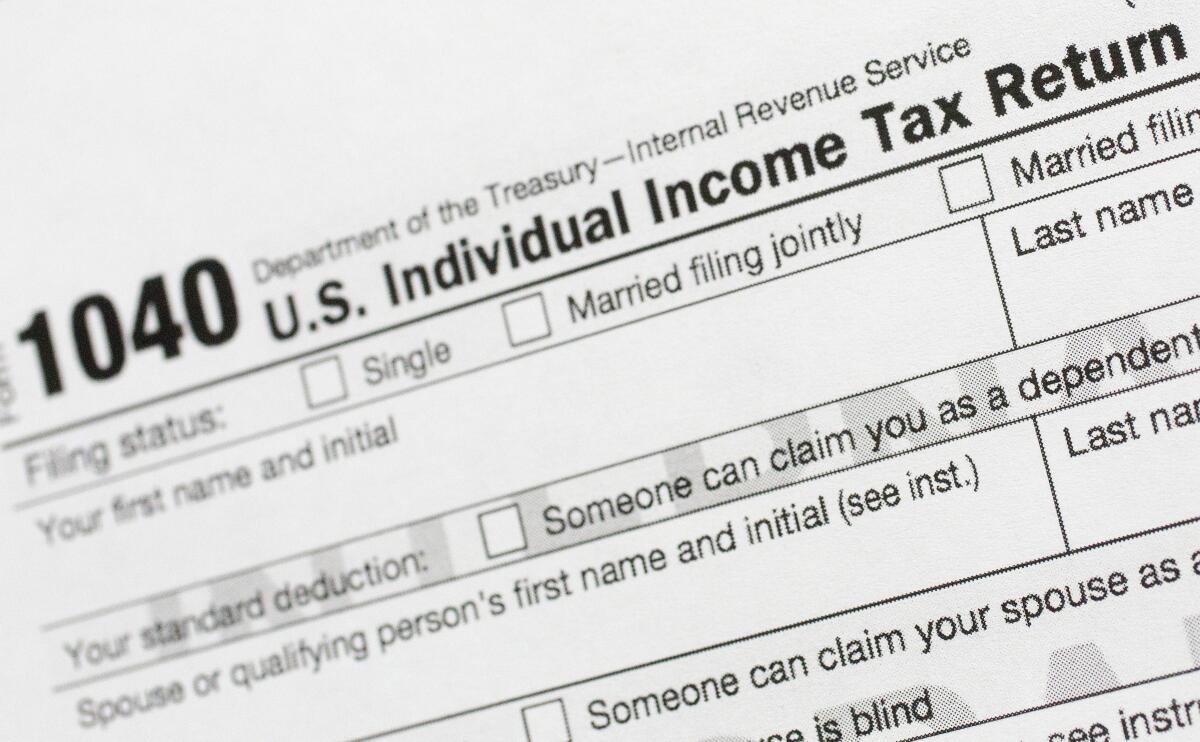More than 2 million Californians may be leaving stimulus money on the table. Here’s how to get it

- Share via
More than 2 million Californians have fallen into a “stimulus gap,” in which they are entitled to money from federal COVID-19 relief programs but haven’t yet received it. And they may be in danger of never collecting the money, according to a new report from the California Policy Lab.
Since April 2020, three payments totaling up to $3,200 per person have been sent to qualifying Americans. Of the 2.2 million Californians in the so-called stimulus gap, 1.4 million may have missed out on all three rounds of payments. Those who filed their state taxes in 2018 but not 2019, an estimated 424,000 Californians, are at risk of not receiving their second and third payments. And with the most recent relief package, an estimated 360,000 dependents may also be missing out.
For the record:
5:15 p.m. April 6, 2021A previous version of this article incorrectly said that people younger than 65 may fall into the stimulus gap. The more accurate measure is whether a person is on Social Security or receives veterans benefits. Also, this article previously said people who receive CalFresh or other safety net programs and who receive the earned income tax credit were probably not in the stimulus gap. In fact, people in safety net programs should check whether they qualify for stimulus payments they haven’t received. People with low to moderate incomes should separately check whether they qualify for the EITC. Additionally, the article previously misstated qualifications for certain payments from the Golden State Stimulus bill.
The California Policy Lab at UC Berkeley estimates that $5.7 billion in stimulus money could go unclaimed.
The Internal Revenue Service has been using information from 2019 tax returns to distribute stimulus payments.
That means if you didn’t file taxes for that year, the government doesn’t know where to send your money.
There are several reasons why someone might not file taxes. For example, people whose incomes are lower than the IRS threshold aren’t required to file a return. Thresholds range from about $12,000 to $24,000 a year, depending on marital status and other factors, said Aparna Ramesh, research manager at the California Policy Lab.
For those who don’t normally file taxes, the IRS introduced a non-filers tool in April 2020. This allowed people to submit information to become eligible for stimulus payments. The tool was suspended in November 2020, and the California Policy Lab estimates about 8.1 million households had used it by then.
What should you do if you haven’t received your payouts? First, determine whether you’re eligible. If you are, you may be in the stimulus gap.
Figure out if you’re in the stimulus gap
The California Policy Lab says you could fall into the stimulus gap for the following reasons:
- You did not file a state tax return in 2019 or 2018.
- You are not enrolled in Social Security or receiving veterans benefits.
- You are not enrolled in Supplemental Security Income/State Supplementary Payment or disability insurance (SSDI) programs.
- You didn’t use the IRS’ non-filers tool between April and November 2020.
Some people who don’t normally file taxes are receiving stimulus payments.
If you are part of safety net programs such as CalFresh, you should check to see whether you have received all the payments you are eligible for. The California Policy Lab estimates that 25% of this group “did not automatically receive all payments for which they were eligible.”
People in the U.S. without legal documentation are not eligible for federal support, though they pay more than $3 billion in California and local taxes annually, said Sasha Feldstein, economic justice policy manager at the California Immigrant Policy Center.
However, under the American Rescue Plan Act, which is providing the third stimulus installment, “there’s no ‘marriage penalty’ or ‘family penalty’ denying citizens relief because they have immigrants or ITIN filers in their families,” Feldstein said. An ITIN, or individual taxpayer identification number, allows undocumented individuals to file their taxes without a Social Security number. It doesn’t allow them any federal benefits, but U.S. citizens in their families, such as dependent children, may qualify.
In California, undocumented individuals are able to receive some economic assistance through the Golden State Stimulus signed by Gov. Gavin Newsom in February. If you make less than $75,000 a year, file taxes using an ITIN, and qualify for the California earned income tax credit, you can expect $1,200. In other circumstances, you may qualify for $600. The bill also provides a $600 payment to households enrolled in the CalWorks program, and $600 for recipients of SSI/SSP and the Cash Assistance Program for Immigrants.
How to claim your money
You’re going to have to file a tax return.
“Filing taxes can be cumbersome and time consuming — in particular, for folks who have not filed taxes before, or filed taxes in a while — especially for those who make below the threshold that requires them to file taxes,” Ramesh said. “This was true before the pandemic and is especially true during the pandemic, when in-person volunteer tax prep sites are limited.”
If you rarely or never file taxes, Ramesh recommends trying getyourrefund.org or MyFreeTaxes.com. Volunteer Income Tax Assistance and Tax Counseling for the Elderly for those over 60 provide in-person services.
For undocumented individuals who don’t have an ITIN, you’ll need to apply for one before filing your taxes. The process can take up to seven weeks to complete, according to the IRS website. Feldstein said applications are backlogged for up to six months, meaning payments could take even longer.
Those without documentation may be hesitant to send their personal information to the federal government. “There’s actually really strong privacy protections in place, and strong firewalls set up around the IRS for people who are filing their taxes,” Feldstein said. “There’s certain exceptions, but by and large, yes, people should feel safe to use their ITIN and file their taxes to claim their credits.”
Feldstein said an immigration attorney or advocacy group can advise anyone who has concerns about filing taxes.
More to Read
Inside the business of entertainment
The Wide Shot brings you news, analysis and insights on everything from streaming wars to production — and what it all means for the future.
You may occasionally receive promotional content from the Los Angeles Times.











